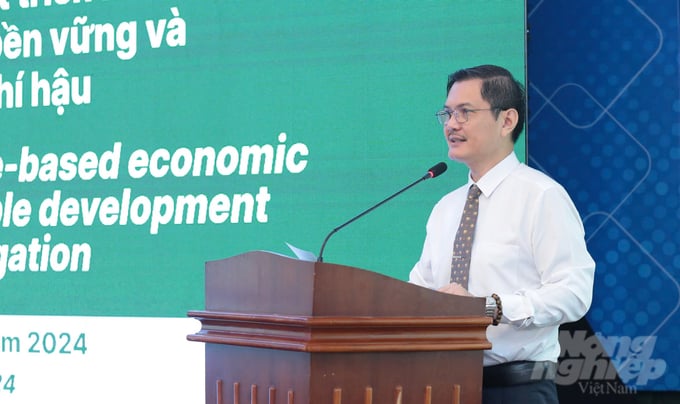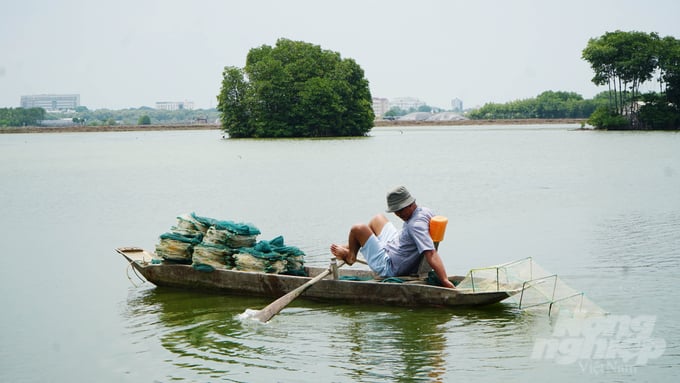December 30, 2025 | 17:36 GMT +7
December 30, 2025 | 17:36 GMT +7
Hotline: 0913.378.918
December 30, 2025 | 17:36 GMT +7
Hotline: 0913.378.918
The Workshop on "Assessing the potential of economic development models based on mangrove forests for sustainable development and climate change mitigation" garnered significant interest. The workshop was jointly organized by Nong Lam University - Ho Chi Minh City and Adelaide University (Australia) on August 22 in Ho Chi Minh City.

Associate Professor, Dr. Nguyen Tat Toan, Rector of Ho Chi Minh City University of Agriculture and Forestry. Photo: Le Binh.
Ass.Prof. Dr. Nguyen Tat Toan, Rector of Nong Lam University - Ho Chi Minh City, stated that mangroves have a significant impact on mitigating and adapting to climate change, promoting environmentally friendly and low-emission economic growth, and fostering socio-economic development.
Mangrove forests are recognized as breeding grounds for numerous marine species and function as very efficient natural defenses for coastal regions against storms and tsunamis. Nevertheless, in the present circumstances, mangrove forests in numerous locations, particularly in the Mekong Delta region, are facing substantial strain, endangering both their extent and biodiversity.
"Mangrove forests are facing significant pressure due to population growth, rapidly accelerating climate change, shifts in policies, consumer preferences for mangrove-associated products, and the economic and social development process," explained Associate Professor Dr. Nguyen Tat Toan.

Mangrove forests are being threatened and gradually disappearing due to climate change and socio-economic development. Photo: Le Binh.
According to Mr. Nguyen Nam Son, a representative from the Department of Forestry (Ministry of Agriculture and Rural Development), our country possesses approximately 160,000 hectares of mangrove forests distributed across 28 provinces and cities. The majority of these forests are located in the Mekong Delta, Southeast region, and the Red River Delta.
Mangrove forests have been experiencing a decline in both their quality and quantity for an extended time, mostly due to a range of factors. Climate change surpasses regional and national boundaries, posing an international concern that affects the entire world. Hence, the most important concern is to adjust to climate change, which necessitates the collaboration of both local communities and nations.

Mr. Nguyen Nam Son, Deputy Head of the Forestry Production Organization Department, Department of Forestry (Ministry of Agriculture and Rural Development) spoke at the workshop. Photo: Le Binh.
An essential strategy for Vietnam for achieving the Net Zero goal, which entails eliminating net emissions, by 2050 is to allocate resources toward the preservation and expansion of forests, namely mangrove forests. Through the successful implementation of forest conservation measures, mangrove forests can significantly increase their worth and make a good contribution to the national adaptation plan and the objectives of reducing greenhouse gas emissions.
"Mangrove forest areas are declining primarily due to natural disasters such as storms, erosion, and saltwater intrusion." "Mr. Nguyen Nam Son shared that the Ministry of Agriculture and Rural Development has recently provided guidance to the Government regarding various policies and plans aimed at safeguarding and enhancing coastal forests in order to address climate change and foster sustainable growth,"
Mangrove forests facilitate the natural growth and development of numerous economically significant aquatic and marine species. Furthermore, mangrove forests excel in their capacity to sequester carbon, offering substantial prospects for areas that have mangrove forests.
In order to address climate change and reduce the impact of natural disasters, areas with mangrove forests must implement comprehensive and efficient measures to safeguard, rehabilitate, and enhance these ecosystems.
Conserving and enhancing mangrove forests are essential for maintaining biodiversity and protecting people's livelihoods. It is important to focus on building livelihood models under the forest canopy in order to achieve a balance between economic development and forest protection.

Developing livelihoods under the mangrove canopy properly is also a measure to help protect forest areas from the threat of deforestation. Photo: Le Binh.
Implementing models such as shrimp, crab, and shellfish farming inside mangrove canopies serves the dual purpose of stabilizing the local economy and providing educational opportunities for tourists to learn about the significance of mangrove forests, especially when combined with well-structured tourism. Nevertheless, experts stress the importance of implementing precise restrictions to prevent the encroachment of forest areas, the disruption of planning, and the adoption of incorrect farming practices that fail to meet market demands.
Translated by Linh Linh

(VAN) Located in three former provinces, Nam Dinh, Thai Binh, and Ninh Binh, and now in two provinces, Ninh Binh and Hung Yen, "Red River Delta" is the name of Vietnam's first interprovincial coastal wetland World Biosphere Reserve.
/2025/12/29/1046-1-210728_624.jpg)
(VAN) In 2025, Viet Nam recorded severe and extreme disasters, breaking multiple historical records and causing heavy losses in lives, property, and infrastructure nationwide.

(VAN) Applied technologies, water-saving irrigation is a strategic solution to promote climate-resilient agriculture and strengthen water security in the uplands.
/2025/12/29/3936-3-163422_251.jpg)
(VAN) Can Gio mangrove forest in particular and the entire Can Gio Mangrove Biosphere Reserve in general hold great potential for carbon credits.

(VAN) Chu Pah Rubber has announced its products that comply with the EU Deforestation Regulation (EUDR), affirming its commitment to sustainable production and product origin transparency.

(VAN) Deputy Director Nguyen Hoai Nam stated that a digital data platform will be developed with agricultural sector databases, utilizing AI to help farmers make informed decisions on 'watering correctly, sufficiently, and efficiently.’
/2025/12/29/4841-2-134224_777.jpg)
(VAN) From only about 10 individuals in 2009, the wild elephant population in Dong Nai has recovered to nearly 30 animals after more than 10 years.